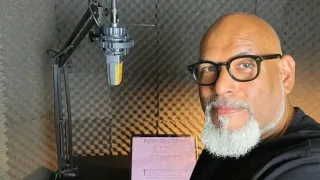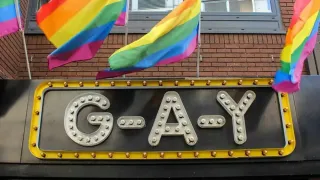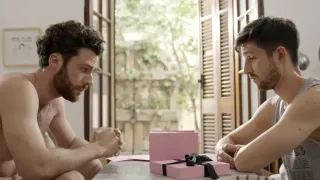April 18, 2015
Charting the Course
Kilian Melloy READ TIME: 4 MIN.
A funny thing happened on the way to the San Francisco Symphony last week. The cab driver, expertly navigating rush-hour traffic to make a 6:30 p.m. start at Davies Symphony Hall, wanted to know all about the upcoming concert so he could share his own opinions on the scheduled repertoire, the featured artists and the early curtain-time. His smart and irreverent remarks were heartening. San Francisco still has a big and enthusiastic audience for "serious" music, and even if they cannot all be subscribers (it isn't cheap), they are still listening when possible, and watching the arts calendars with interest.
We talked about the two "modern" pieces opening the bill: the first SFS performances of John Adams' witty and energetic Chamber Symphony (1992), and the much older Arnold Schoenberg Chamber Symphony No. 1, Opus 9b (1906), also receiving its first SFS hearing. The second half of the evening, Tchaikovsky's Violin Concerto (1873), served as a vehicle for the return of guest artist (we've lost count), American superstar Joshua Bell. The conductor was Pablo Heras-Casado, who made his SFS debut in October 2010, and has returned every season since.
The driver agreed the early start made it possible on a Friday (a workday for most patrons) to get a nice start on the weekend with a concert that still allows for the enjoyment of a late civilized meal or drinks. He also thought it might attract a younger crowd, but wondered if it was being marketed well enough. After all, this was the first he had heard of it, even though the 6.5 series has been around for years now.
He voiced what I had been thinking about the talented guest artists. "They'll come for Heras-Casado and Bell, but they'll stay for Bell." I added that putting the renowned instrumentalist on the second half of the program virtually guaranteed no deserters at intermission. I was actually looking forward more to Heras-Casado's appearance. Another Joshua Bell triumph was easily predictable. I was not disappointed, and I wish I could have reported back to the taxi driver that the young Spanish conductor, named Musical America's Conductor of the Year 2014, not only fulfilled my expectations, but also his forecast of excellence.
The Adams Chamber Symphony was written, according to the composer, as something of an antidote to the overwhelming attention, both negative and positive, given to his controversial opera "The Death of Klinghoffer" (1991). Last year the Met found out "Klinghoffer" can still provoke a tempest, so we say, Bon chance, Berkeley Symphony, when you offer the Choruses from that opera on April 30 at Zellerbach Hall alongside the Mozart Requiem.
The SFS treated us to the amusing and altogether cheerier Chamber Symphony without the composer (or public furor) in attendance, and Heras-Casado's crisp and well-timed interpretation reminded us yet again just how ingenious and satisfying our local genius' music can be. The musicians, with principal percussionist Jacob Nissly adding contemporary pulse on drums, and other soloists gleefully intent on charting an absorbing course through the whimsically titled movements ("Mongrel Airs" and "Roadrunner," to name two), served the author with verve, if not the last degree of dash. The conductor seemed to be reining them in more than necessary, but it didn't spoil the effect, and the following piece on the bill was probably at the back of his mind all the while.
Schoenberg's Chamber Symphony No. 1 was another big influence on Adams, probably more than the kinetic and aggressive cartoon scores of the 1950s, and Heras-Casado's carefully controlled treatment of the lush Opus 9b made a good comparison. It was a splendid rendition that should have calmed anyone's fears about Schoenberg's atonality. Emphasizing the sensual and expressionistic elements of the work, Heras-Casado made a wonderful impression. Why on earth did it take so long to get a hearing at DSH?
The two women seated behind me rose after the polite ovation that followed to head up the aisle for intermission. One said, "Well, we could have skipped the first half." Okay, Mr. Yellow Cab, you were right on that one, and I was disappointed at the mostly game audience's subdued (but predictable) response. That's why the formula of mix-and-match programming continues to keep the subscribers happy.
They returned for a powerhouse reading of the mighty Tchaikovsky Concerto essayed by a genuine virtuoso. They heartily and deservedly rewarded him with a prolonged standing ovation. If they were begging for an encore, Bell pointedly took his calls sans instrument, but he earned a bit of a rest after his expert workout.
We will never tire of visiting stars, especially when they are as appealing and accomplished as Joshua Bell. We will also be grateful that the SFS continues to bring more "difficult" musical experiences to a sophisticated but basically conservative audience. The cab driver said he was going to aim for Terrace seating the following night (still one of the best concert deals in town), and I hope he made it.
Pablo Heras-Casado continues his guest stint this week with Debussy, Mozart and Stravinsky on the bill.






